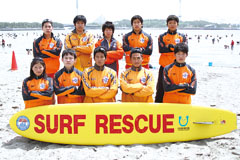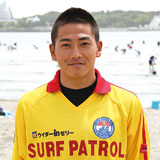SPORTS YOKOHAMA Vol.25:Feature02

 Keiji Ochiai’s Records at Major Tournaments in 2010
Keiji Ochiai’s Records at Major Tournaments in 2010
Japan National Lifesaving Championships (Event by Event)
– Paddle Board Race – 5th place
– Surf Ski Race – 3rd place
– Ocean Man – 6th place
Japan National Lifesaving Championships
– Paddle Board Race – 4th place
– Ocean Man – 2nd place
International Surf Rescue Challenge 2011 (New Zealand) – Participated as a member of Japan’s national team.
♦Switch from Competitive Swimming to Lifesaving
Mr. Ochiai, native to Kohoku Ward of Yokohama City, was a competitive swimmer until he graduated from high school. After entering university, he took up lifesaving at the invitation of a person who was his senior at high school. At first, Mr. Ochiai patrolled the Marine Park with confidence, thinking that he could cope with anything because he was a good swimmer. In his freshman year at university, however, he encountered a drowning incident and realized that he was helpless. He was impressed by senior lifesavers who responded to the incident promptly and adeptly. This made him recognize the need for him to do training in order to improve his knowledge and judgment as a lifesaver. Later on, Mr. Ochiai hoped to make use of his lifesaving experience and joined the local fire department, where he volunteered to be a member of the lifesaving squad.
♦Lifesaving Is a Popular Sport Overseas
Mr. Ochiai took part in an international lifesaving competition held in New Zealand as a member of Japan’s national team. New Zealand and Australia have professional lifesaving services, and lifesaving competitions are so popular that they are broadcast on TV. In these countries, lifesaving is recognized as a sport that everyone from children to elderly people can enjoy. Mr. Ochiai, who has witnessed these situations of lifesavers abroad, stresses the appeal of lifesaving as a sport, saying: “I want lifesaving to be as popular as it is over there. Lifesaving races tend to be very close ones, and you’ll surely find them exciting. I want everyone to watch these competitions.”
♦Goal Is to Win World Championships
“I’m still an active lifesaver and participate in competitions. The world championships are held once every two years. To take part in that event as a member of Japan’s national team, you need to perform well in qualifying trials, be chosen as a specially designated player and then make it to the national team. My goal for this year is to become a member of Japan’s national team for the world championships that will take place in Australia in 2012,” says Mr. Ochiai, who keeps practicing hard with this specific goal in his mind.
♦Cautions about the Marine Park
According to Mr. Ochiai, the Marine Park has a shoaling beach with calm water, which at a glance may seem to be a perfectly safe bathing place where you can swim in a carefree manner. But, because the water levels change wildly as the tide rises and falls, he says, there is a danger that children may be drowned at high tide unless you pay enough attention. He also notes that there have been occasions where visitors drinking alcohol in the adjoining barbeque garden have jumped into the sea and gotten seriously injured. “Incidents occur when you think the beach a perfectly safe place and let your guard down. I want you to stay fully alert while out on the beach,” says Mr. Ochiai.

Members of the Yokohama Marine Park Lifesaving Club

 Keiji Ochiai’s Records at Major Tournaments in 2010
Keiji Ochiai’s Records at Major Tournaments in 2010
Japan National Lifesaving Championships (Event by Event)
– Paddle Board Race – 5th place
– Surf Ski Race – 3rd place
– Ocean Man – 6th place
Japan National Lifesaving Championships
– Paddle Board Race – 4th place
– Ocean Man – 2nd place
International Surf Rescue Challenge 2011 (New Zealand) – Participated as a member of Japan’s national team.
♦Switch from Competitive Swimming to Lifesaving
Mr. Ochiai, native to Kohoku Ward of Yokohama City, was a competitive swimmer until he graduated from high school. After entering university, he took up lifesaving at the invitation of a person who was his senior at high school. At first, Mr. Ochiai patrolled the Marine Park with confidence, thinking that he could cope with anything because he was a good swimmer. In his freshman year at university, however, he encountered a drowning incident and realized that he was helpless. He was impressed by senior lifesavers who responded to the incident promptly and adeptly. This made him recognize the need for him to do training in order to improve his knowledge and judgment as a lifesaver. Later on, Mr. Ochiai hoped to make use of his lifesaving experience and joined the local fire department, where he volunteered to be a member of the lifesaving squad.
♦Lifesaving Is a Popular Sport Overseas
Mr. Ochiai took part in an international lifesaving competition held in New Zealand as a member of Japan’s national team. New Zealand and Australia have professional lifesaving services, and lifesaving competitions are so popular that they are broadcast on TV. In these countries, lifesaving is recognized as a sport that everyone from children to elderly people can enjoy. Mr. Ochiai, who has witnessed these situations of lifesavers abroad, stresses the appeal of lifesaving as a sport, saying: “I want lifesaving to be as popular as it is over there. Lifesaving races tend to be very close ones, and you’ll surely find them exciting. I want everyone to watch these competitions.”
♦Goal Is to Win World Championships
“I’m still an active lifesaver and participate in competitions. The world championships are held once every two years. To take part in that event as a member of Japan’s national team, you need to perform well in qualifying trials, be chosen as a specially designated player and then make it to the national team. My goal for this year is to become a member of Japan’s national team for the world championships that will take place in Australia in 2012,” says Mr. Ochiai, who keeps practicing hard with this specific goal in his mind.
♦Cautions about the Marine Park
According to Mr. Ochiai, the Marine Park has a shoaling beach with calm water, which at a glance may seem to be a perfectly safe bathing place where you can swim in a carefree manner. But, because the water levels change wildly as the tide rises and falls, he says, there is a danger that children may be drowned at high tide unless you pay enough attention. He also notes that there have been occasions where visitors drinking alcohol in the adjoining barbeque garden have jumped into the sea and gotten seriously injured. “Incidents occur when you think the beach a perfectly safe place and let your guard down. I want you to stay fully alert while out on the beach,” says Mr. Ochiai.

Members of the Yokohama Marine Park Lifesaving Club
 ハマスポ
ハマスポ
 お知らせ&トピックス
お知らせ&トピックス Keiji Ochiai’s Records at Major Tournaments in 2010
Keiji Ochiai’s Records at Major Tournaments in 2010 ページトップへ戻る
ページトップへ戻る ページトップへ戻る
ページトップへ戻る

